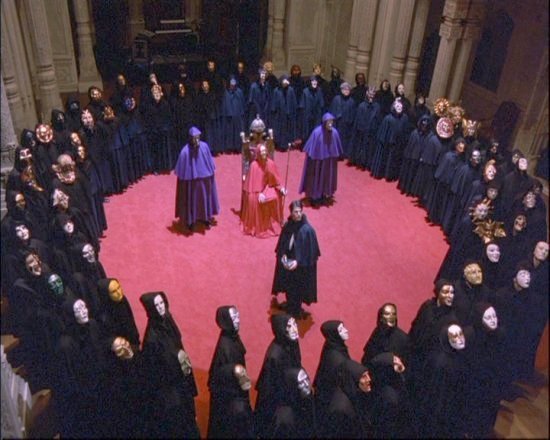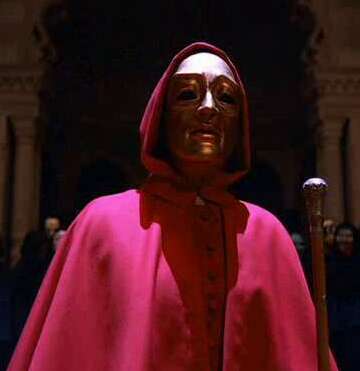Kubrick's films are characterized by a formal visual style and meticulous attention to detail. His later films often have elements of surrealism and expressionism and often lack structured linear narrative. His films are frequently described as slow and methodical, and are often perceived as a reflection of his obsessive and perfectionist nature. A recurring theme in his films is man's inhumanity to man. While often viewed as expressing an ironic pessimism, some critics feel his films contain a cautious optimism when viewed more carefully.
Even though all his films, apart from the first two, were adapted from novels or short stories, his works have been described by Jason Ankeny and others as "original and visionary". Although some critics, notably Andrew Sarris and Pauline Kael, frequently disparaged Kubrick's work, Ankeny describes Kubrick as one of the most "universally acclaimed and influential directors of the postwar era" with a "standing unique among the filmmakers of his day."
Stanley Kubrick was born on July 26, 1928, at the Lying-In Hospital in Manhattan, New York, the first of two children born to Jewish parents, Jacques (Jacob) Leonard Kubrick (1901–85) and his wife Sadie Gertrude (née Perveler; 1903–85). His sister, Barbara Mary Kubrick, was born in 1934. Jacques Kubrick, whose parents and paternal grandparents were Jewish of Austrian, Romanian and Polish origin, was a doctor. At Stanley's birth, the Kubricks lived in an apartment at 2160 Clinton Avenue in The Bronx.
Kubrick biographer, Geoffrey Cocks, writes that although Kubrick descended from eastern European Jews, and was raised in a Jewish neighborhood in New York City, his family was not religious, although his parents had been married in a Jewish ceremony. When critic Michel Ciment asked him in 1980 whether he had a religious upbringing, Kubrick replied "No, not at all." He had no bar mitzvah and apparently did not attend synagogue. Although after his death, both his daughter and wife stated that "He did not deny his Jewishness, not at all." His daughter noted that he wanted to make a film about the Holocaust, to have been called Aryan Papers, and spent years researching the subject. Most of his friends and early photography and film collaborators were Jewish, and his first two marriages were to daughters of recent Jewish immigrants from Europe.
A friend of Kubrick's family notes that although his father was a prominent doctor, "Stanley and his mom were such regular people. They had no airs about them. . . . His mother was so down to earth, she was lovely." As a boy, he was considered "bookish" and generally uninterested in activities in his Bronx neighborhood. According to a friend, "When we were teenagers hanging around the Bronx, he was just another bright, neurotic, talented guy—just another guy trying to get into a game with my softball club and mess around with girls . . ." Many of his friends from his "close knit neighborhood" would become involved with his early films, including writing music scores and scripts.
Kubrick's father taught him chess at age twelve, and the game remained a lifelong obsession. Kubrick later recalled the significance of his chess hobby to his career:
He also bought his son a Graflex camera when he was thirteen, triggering a fascination with still photography. As a teenager, Kubrick was interested in jazz, and briefly attempted a career as a drummer. His father was disappointed in his failure to achieve excellence in school, which he felt Stanley was capable of. His father encouraged him to read from his large library at home while at the same time permitting him to take up photography as a serious hobby. These additional interests outside of school may have ironically contributed to his poor performance as a student. However, British screenwriter Frederic Raphael, who worked closely with him in his final years, believes that the originality of Kubrick's films was partly because he "had a (Jewish?) respect for scholars," noting that it was "absurd to try to understand Stanley Kubrick without reckoning on Jewishness as a fundamental aspect of his mentality." He points out, nonetheless, that when Kubrick died, "few of the obituaries mentioned that he was a Jew." Kubrick attended William Howard Taft High School from 1941 to 45. He was a poor student, with a meager 67 grade average. According to his English teacher, Kubrick was not a great student, and school didn't interest him. However, "the idea of literature and the reading of literature, from a non-academic, from a more human point of view, clearly was what interested him. He was a literary guy even as a young man . . . " Kubrick also had a poor attendance record, and often skipped school to take in double-feature films. He graduated from high school in 1945, but his poor grades, combined with the demand for college admissions from soldiers returning from the Second World War, eliminated any hopes of higher education. Later in life, Kubrick spoke disdainfully of his education and of education in general, maintaining that nothing about school interested him. His parents sent him to live with relatives for a year in Los Angeles in the hopes that it would help his academic growth.
Even though all his films, apart from the first two, were adapted from novels or short stories, his works have been described by Jason Ankeny and others as "original and visionary". Although some critics, notably Andrew Sarris and Pauline Kael, frequently disparaged Kubrick's work, Ankeny describes Kubrick as one of the most "universally acclaimed and influential directors of the postwar era" with a "standing unique among the filmmakers of his day."
Stanley Kubrick was born on July 26, 1928, at the Lying-In Hospital in Manhattan, New York, the first of two children born to Jewish parents, Jacques (Jacob) Leonard Kubrick (1901–85) and his wife Sadie Gertrude (née Perveler; 1903–85). His sister, Barbara Mary Kubrick, was born in 1934. Jacques Kubrick, whose parents and paternal grandparents were Jewish of Austrian, Romanian and Polish origin, was a doctor. At Stanley's birth, the Kubricks lived in an apartment at 2160 Clinton Avenue in The Bronx.
 EYES WIDE SHUT Mask |  Eyes Wide Shut Masks |  props from EYES WIDE SHUT |  Eyes Wide Shut, Stanley |  our eyes. |
 Eyes Wide Shut. Kubrick |  Eyes Wide Shut, |  Eyes Wide Shut |  Seeing \x26#39;Eyes Wide Shut\x26#39;. |  Eyes Wide Shut (1999) - The |
Kubrick's father taught him chess at age twelve, and the game remained a lifelong obsession. Kubrick later recalled the significance of his chess hobby to his career:
 Eyes Wide Shut - Venice. There were many mask shops around Venice. |  movie \x26quot;Eyes Wide Shut\x26quot;, |  \x26quot;Remove your clothes. |  Masquerade - Venice |  out of \x26quot;Eyes Wide Shut.\x26quot; |
 owner in Eyes Wide Shut. |  New DVDs: Stanley Kubrick in |  Shot from the orgy scene. |  scenes from Eyes Wide Shut |  Eyes wide shut at Lap,Samrat |
No comments:
Post a Comment